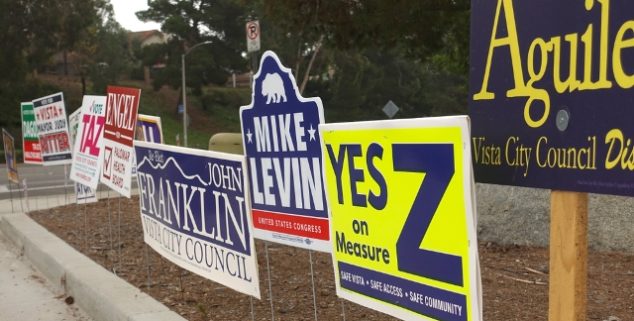News
California’s hunt for political relevance
 Political messaging in the city of Vista in the 49th Congressional District prior to election day. (Photo: Simone Hogan, via Shutterstock)
Political messaging in the city of Vista in the 49th Congressional District prior to election day. (Photo: Simone Hogan, via Shutterstock)On election night, California’s closely watched congressional races, viewed as crucial to Democrats’ attempts to capture the House, were largely irrelevant, after all.
Democrats needed to pick up 23 seats nationally to reach a House majority and they got 26 before Golden State voters even weighed in — far short of the number predicted by numerous campaign strategists but still enough to give Democrats control.
But California’s performance solidified the Democrats’ edge in the House and startled the state’ political observers. And, as it turned out, the pre-election predictions of Democrats picking up 35 to 40 House seats nationally were right on the money.
In 2020, its presidential primary will be held in March, instead of June, along with consolidated congressional elections.
By Friday, five – and perhaps six – of Republican-held House seats were captured by Democrats. Half of them had been Republican strongholds for decades.
Nationally, including the California races, Democrats picked up an estimated 39 seats.
Before the election, California’s 53-member House delegation stood at 39 Democrats and 14 Republicans. Post-election, it is likely to be 44-9, or even 45-8, depending on the final counts, which are continuing.
The sixth seat, the 39th Congressional District in Orange County, has not been called, but Democrat Gil Cisneros has a slight, expanding, 941-vote edge over GOP contender Young Kim – 104,003 votes to 100,062, or 50.2% to 49.8 percent. Kim claimed voter fraud.
Being politically irrelevant on the national stage is nothing new to solid-blue California, despite its large congressional delegation, 40 million people, resources, economic clout, political cash dispensary, international heft, Hollywood and Silicon Valley.
Traditionally, its polls have closed after most states. Its primary elections occur months after many states.
There was drama in the contests for a handful of California’s GOP-held congressional races
California hopes to fix that, taking a page from a past playbook: In 2020, its presidential primary will be held in March, instead of June, along with consolidated congressional elections. In 2016, presidential candidates Donald Trump and Hillary Clinton were identified as the major parties’ presumptive nominees before Californians had even voted in June. State officials were not pleased.
This was tried before, when California’s presidential primary was moved to March in 1996. Years later, lawmakers moved it back to June for the 2008 primary.
There was little drama on Nov. 6 in the top-of-the-ticket race, the election of Democrat Gavin Newsom as governor, who had been leading in the polls for months. He’ll take office in January.
There were two close races down ticket, however.
Tony Thurmond led Marshall Tuck in the race for state schools superintendent, 50.4% to 49.6%, or about 78,000 votes out of more than 8.4 million cast. In the contest for state insurance commissioner, state Sen. Ricardo Lara, a Democrat defeated independent Steve Poizner – a former insurance commissioner and a Republican-turned independent — by about 290,000 votes out of 9.3 million ballots cast, or 51.6% to 48.4%. ( Click here for complete California election results.)
But there was drama in the contests for a handful of California’s GOP-held congressional races, which were seen as vulnerable to Democratic attack.
A big surprise of the election: In the 10th CD, veteran GOP incumbent Jeff Denham was defeated by Democratic challenger Josh Harder,
Some were exactly that: In the 25th Congressional District, Democratic challenger Katie Hill handily defeated GOP incumbent Steve Knight, 52.6% to 47.4%, out of 193,000 ballots cast. In the 49th Congressional District, from which high-profile GOP incumbent Darrell Issa had stepped down, Democrat Mike Levin easily defeated Republican Diane Harkey, 55.4% to 44.6%.
A big surprise of the election: In the 10th CD, veteran GOP incumbent Jeff Denham was defeated by Democratic challenger Josh Harder, 51.3 to 48.7%, a difference of about 5,100 votes out
Meanwhile, in another surprise, this time in Orange County’s 48th CD, Democrat Harley Rouda defeated 15-term GOP incumbent Dana Rohrabacher, 52.9% to 47.1%
And for a trifecta, yet another surprise and again in Orange County: Democratic challenger Katie Porter defeated Republican Mimi Walters, 51.2% to 48.8%. Like Kim, Walters also claimed voter fraud.
To see complete House results from the secretary of state, click here.
Want to see more stories like this? Sign up for The Roundup, the free daily newsletter about California politics from the editors of Capitol Weekly. Stay up to date on the news you need to know.
Sign up below, then look for a confirmation email in your inbox.

Leave a Reply